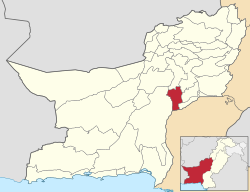Jhal Magsi (District)
| Jhal Magsi District | |
| State : |
|
| Province : | Balochistan |
| Seat : | Jhal Magsi |
| Coordinates : | 28 ° 30 ′ N , 67 ° 30 ′ E |
| Area : | 3 615 km² |
| Residents : | 149,225 (2017) |
| Population density : | 41 inhabitants per km² |
| Time zone : | PST ( UTC + 5 ) |

|
|
The district Jhal Magsi , is an administrative district in Pakistan in the province of Baluchistan . The seat of the district administration is the city of Jhal Magsi .
The district has an area of 3615 km² and according to the 2017 census 149,225 inhabitants. The population density is 41 inhabitants / km².
geography
The district is located on the northeast of the Balochistan Province, which is located in the west of Pakistan and borders Sindh . The Jhall Magsi district consists for the most part of flat land with mountain ranges in the west.
climate
The district's climate is dry and hot. The climatic conditions are very pleasant from November to mid-March. The remaining months are hot. Rainfall in Jhall Magsi is sparse.
history
During the British colonial era, the region was part of the princely state of Kalat . The district was created in 1991 from parts of what is now the Kachhi District (then Bolan). The district was first named Kachhi and was renamed Jhal Magsi in 1992.
Administrative division
The district is administratively divided into two tehsil :
Demographics
Between 1998 and 2017, the population grew by 1.62% annually. Around 18% of the population live in urban regions and around 82% in rural regions. 76,902 men and 72,322 women live in 25,047 households, resulting in a gender ratio of 106.3 men per 100 women, which is a frequent male surplus for Pakistan.
The literacy rate in 2014/15 among the population aged 10 and over was 25% (women: 11%, men: 38%).
| year | population |
|---|---|
| 1998 | 109,941 |
| 2017 | 149.225 |
Web links
Individual evidence
- ↑ a b DISTRICT WISE CENSUS RESULTS CENSUS 2017. August 29, 2017, accessed May 30, 2019 .
- ↑ Pakistani Districts wise Population Census 2017. Accessed May 30, 2019 .
- ↑ District Development Profile: Qilla Saifullah. Retrieved June 28, 2019 .
- ↑ a b Index of / DistrictProfile / DDP Final 2012. Accessed June 28, 2019 .
- ^ Pakistan Bureau of Statistics (2016). Pakistan Social and Living Standards Measurement Survey 2014-15. Government of Pakistan, accessed June 29, 2019 .
